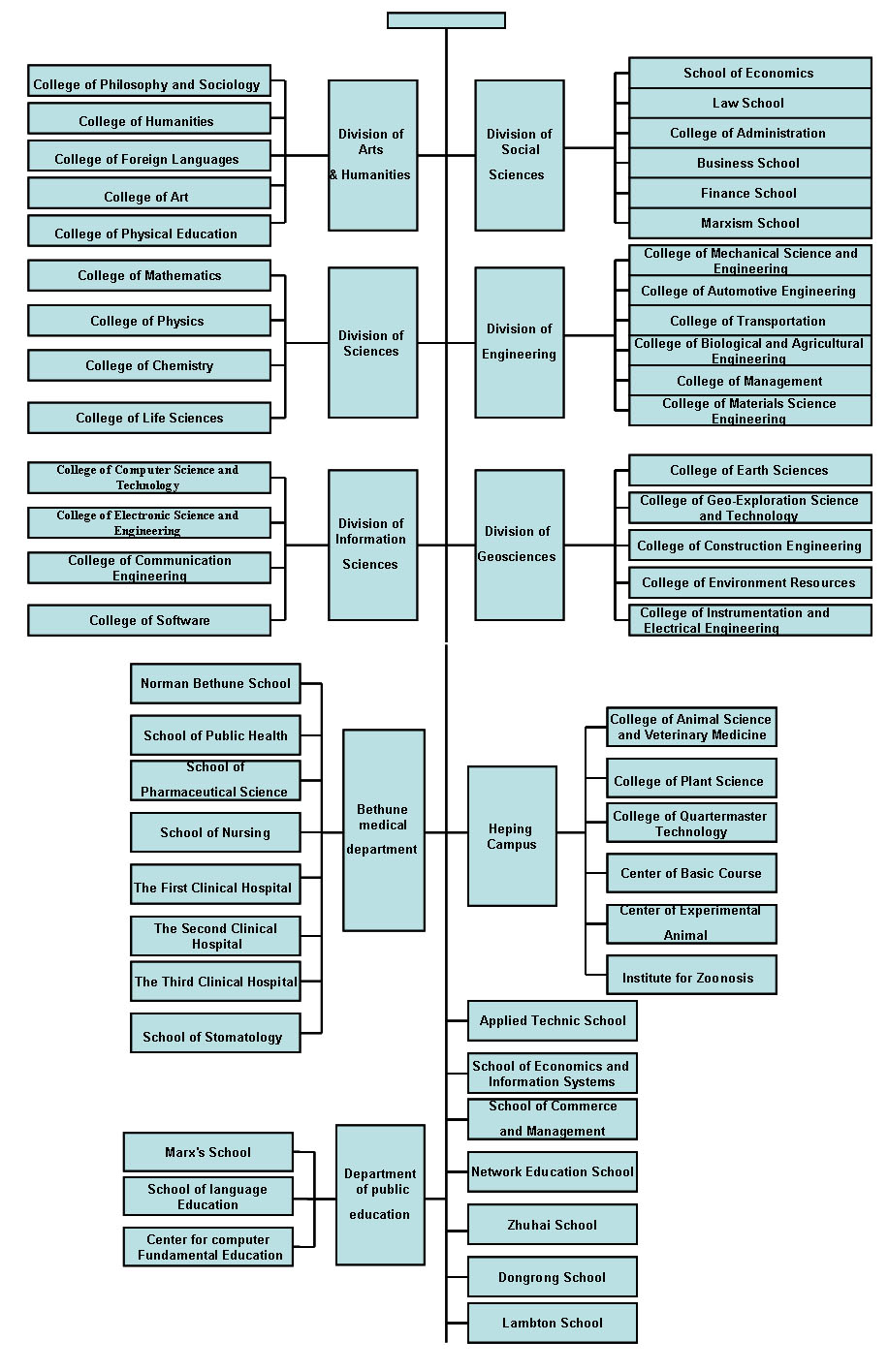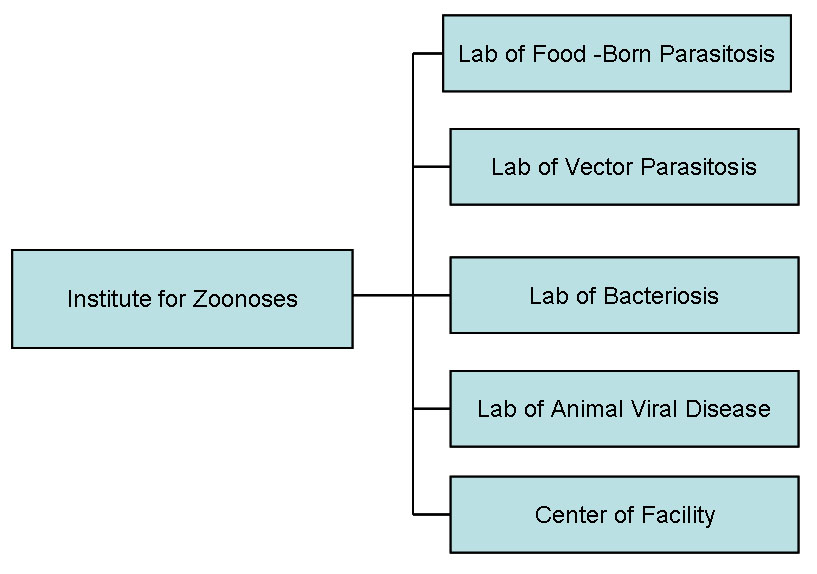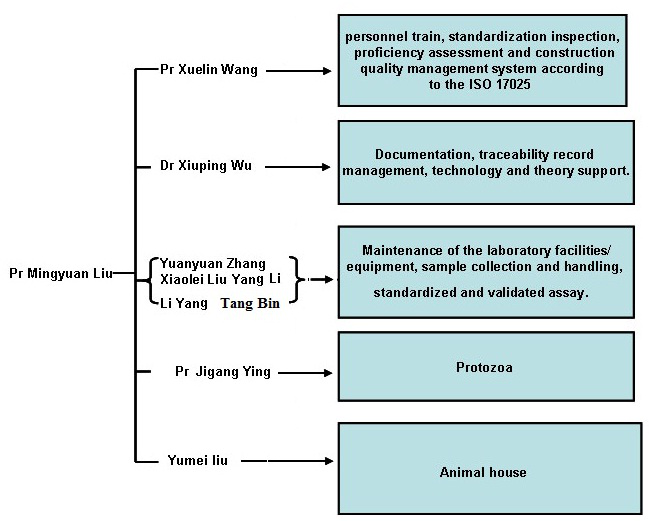 Introduction
Introduction
Introduction
1. Description of the structure and official mandates
1.1 Name and address of the institution
Key Laboratory for Zoonoses, Ministry of Education, Institute of Zoonosis, Jilin University, 5333 Xian Road, 130062 Changchun, P. R. China
1.2 Name of the responsible persons of the institution
Dr. Ji Zhao: Executive president of Jilin University.
Dr. Wenyu Han: Director of Heping campus, Jilin university.
1.3 Name of the proposed director for the Collaborating Center
Prof. Liu Mingyuan: Ph.D. Director of Institute of Zoonoses; Jilin University; 5333 Xian Road, 130062 Changchun; P. R. China. Tel/Fax: +86 431 87836702, Mobile: +86 13019125996. Email: liumy@jlu.edu.cn.
Informal curriculum vitae: As one of the eminence scientists of China in zoonoses field, Prof Liu Mingyuan was as a founder to establish the Institute of Zoonoses in Jilin University and appointed as the director of the institute in 2006. The Institute became the Key Laboratory for Zoonoses Research, Ministry of Education, P. R. China in 2007. His academic positions includes the vice president of International Commission of Trichinellosis (ICT) (2011.08-now), Executive member of executive committee of ICT (2007.09-now), WHO and FAO expert in foodborn parasites (2012.08-now), and one of the only three awardee getting National Science Funds for Distinguished Young Scholars in Veterinary Parasitology field. His academic activities cover immunology, epidemiology, molecular biology, genomics and proteomics of foodborne parasites. His contributions in diagnosis and prevention of trichinosis had ranked as the top one scientist in China. His discovery, Trichinella spiralis rapid detection kit has been use in epidemiology investigation of trichinosis in China. Prof Liu posses 9 patents and register over 120 sequences of Trichinella spiralis in Genebank. His study publications include 43 international journal papers and 112 Chinese journal papers. His recent contribution in Trichinellosis titled “Differential DNA methylation in discrete developmental stages of the parasitic nematode Trichinella spiralis” was published in Genome Biol (impact factor 10.30), was commented as “Rewriting the DNA (hydroxy) methylation textbook” by BMC Publication Group. The formal curriculum vitae of Dr. Mingyuan Liu was given in appendix 1.
1.4 Scientific topic for which the Collaborating Center is proposed
The Collaborating center will concern Parasites transmitted by food: Helminthes (Trichinella sp.; Cysticercosis, Clonorchis sinensis), Protozoa (Toxoplasma, Cryptopsoridium).
1.5 Description of Organizations and the Collaborating Center
1.5.1 Jilin University
Jilin University (JLU) founded in 1946, located in Changchun City of the capital of Jilin province, is a key comprehensive university directly subordinated to Education Ministry of China. JLU enrolled first echelon " 211 Project" university of China in 1995, was one of " 985 Project" universities in 2001, ranked among the top 10 universities in China and among the top 500 in the world.JLU can offering courses in 12 major disciplines and posses 6,776 excellent registered teachers included1,895 professores. Jilin University, was among the first to establish the Graduate School of 22 universities. JLU’s education system covered a series of programs from baccalaureate, master’s, doctoral to post-doc for the training of high level training professional personnel. JLU’s enrollment is 68,193 fulltime students, 42,365 graduate students, 42,349 the college students ,337 international students ,142 visiting students and another 70,018 adult education students , including adult students of the college 14,647 people , the network of the college students 55,371 people . It is the highest in China. JLU’s international communication, inter-school cooperation is extensive . JLU has built closely cooperation and communication with the United States , Germany, South Korea , more than 130 colleges and research institutions of 40 countries and regions. JLU has established intercollegiate relationships with the University of Tuebingen, Germany , University of Amsterdam, The Netherlands , Tomsk Polytechnic University, Russia,the University of Florida , University of Waterloo , Canada , Korea University and other world -renowned university.

Organization chart of Jilin University
1.5.2 Institute of Zoonosis, Jilin University
Institute of Zoonoses at Jilin University (IZJU), established on January 5, 2006, is the first specialized organization to study zoonoses in China. The Institute became the Key Laboratory for Zoonoses Research, Ministry of Education, P. R. China in 2007. The research focus is on bacterial, viral, and parasitic zoonoses. The present superintendent is Professor Mingyuan Liu. As the first institution in China to award a doctorate in the study of zoonotic diseases, the institute is composed of five research divisions with 9 full professors, 9 visiting professors, 9 associate professors, 6 lecturers, 1 engineer and 5 technicians.
Currently, the Lab occupies 5000 Square meters space with advanced facilities. It is composed of two BSL-2 rooms for biochemistry detection and six BSL-2 rooms for the diagnosis, identification and examination of Trichinella sp., Cysticercosis, Clonorchis sinensis, Toxoplasma, Cryptopsoridium. A state-of-the-art animal experimental research complex, including one BSL-3 animal facility is under construction in the Institute’s division.
The equipments center of Jilin University agricultural division was localized in the Institute, Including equpments Confocal Microscopy (FV1000S-Ⅸ81, OLYMPUS, Japan), FACS (Aria TM BD, US), Scanning Electron Microscope (S-3400N, HITACHI, Japan), Transmission Electron Microscope (H-7650, HITACHI, Japan), Real Time Q PCR (7500, ABI, US), Bio-safety Cabinet (SG403, BaKer, US), Imaging Statio (GEL Doc-It Imaging Statio, UVP, US), Tgradient PCR (Biometra, German)、PCR (Tpersonal, German), High Speed Desk Centrifuge (Biofuge pic, German), High Speed Desk Refrigerate Centrifuge (Biofuge strato, German), Electrophoretic Apparatus (EPS2A200, Amersham,British), Vertical Electrophoresis System (SE25, US), Horizontal Strip Electrophoresis System (HE33, US), Mini Transfer Tank for Electrophoresis (TE22, US), Ultrasonic Homogenizer (VCX130/SONICS, US), CO2 Gas incubator(eHF151UV, Heal Forc, Hong Kong), Water Purification System(MILLI-Q BIOCEL, Millipore, US)and Protein Purification System (A PurifierTM 100, AKAT, US). All permanent technican worked in the lab can provide skillful, qualified service for the OIE center.
Diagnostic methods along with standard operation protocols (SOPs) were established to meet international standards (OIE and WHO).
Thousands of animal samples of Trichinella sp, Cysticercosis, Clonorchis sinensis, Toxoplasma, Cryptosporidium from the provincial Centre for Animal Disease Control and Prevention (Jilin Province) are detected and confirmed in the lab each year. Since 2008, the lab has analyzed more than 6000 specimens and made several isolations of parasites from dogs, pigs, fishes, water and also human.
The Laboratory has also launched two techniques training workshops on the diagnosis of foodborne parasites.

Organization chart of Institute of Zoonosis/Key Laboratory for Zoonoses, Ministry of Education, Jilin University.
1.5.3 Structure of the Collaborating center within the organization
Permanent Staff:
- Director: Pr Mingyuan Liu: Management, survey, scientific instruction, check and regulatory oversight.
- Key scientist: Pr Xuelin Wang: Standardization inspection, proficiency assessment and construction quality management system according to the ISO 17025.
- Key scientist: Dr Xiuping Wu: Documentation, traceability record management, technology and theory support.
- Analyst: Yuanyuan Zhang (MS), Xiaolei Liu (PhD)and Li Yang (PhD): Maintenance of the laboratory facilities/equipment, sample collection and handling, standardized and validated assay.
- Animal house: Yumei liu.
- Key scientists by specialties: Helminths: Liu Mingyuan, Wang Xuelin, Wu Xiuping. Protozoa: Jigang Ying,

Organization chart of the proposed center
1.6 Official support to the center
An official document of the Jilin University gives support for the reference activities of the center at the institute of zoonoses.
- A primary budget (3 million RMB) has been already allocated for the construction (labs and equipments) of the centre.
- The salary of permanent staff will be supported by Jilin university
- The cost for maintenance of the centre will be covered by Jilin university. 0.5 million per year.
2. Scientific and technical Part—Main activities in the field of the specific topices in the Collaborating Center
Laboratory for Foodborne Parasites, Institute of Zoonosis, Jilin University. This laboratory is also the Key Laboratory for Zoonosis Research, Ministry of Education. In this context, the laboratory is involved in routine tests to confirm diagnosis (more than 1000 tests/year), develop and standardize tests on foodborne parasites, publish some review on Asian parasitology (for exemple involment in the “Asian parasitology” books, Ed the Federation of Asian Parasitologists, 2005), is able to give some guidance to competent authority for foodborne parasite managements, participate to international expertises (FAO/WHO) and can organise training and international symposium (international workshop or congress have been organised in Jilin University by The Instititute of Zoonoses (see annexe 3).
The aim of the project is to propose an OIE collaborative center on foodborne parasites in Asia that will have the functions as following: - To elaborate standard protocoles for foodborne parasites control and to write some guidlines in the field such as the standards and guidelines done by the international commission on trichinellosis for Trichinella. - To publish an annual report on the impact of foodborne parasites in the area with the help of a laboratories network. - To establish coordinated depository for the major foodborne parasites in Asia. - To organise training and international symposium for the spreading of the knowledge. - To elaborate a network of cooperation between serveral laboratories working on foodborne parasites in Asia and establish sub-depositories for the main parasites. The network of provincial animal disease centers is existing in China and cover all the coutry. This network will be very usefull to give some information on foodborne parasite and to collect samples for the Center. This network will be enlarged with partner laboratories belonging to Thailand, Japan, North Korea, South Korea, Vietnam, Cambodgia, Laos and et al. Preliminary contacts indicated the possibility to build a wide efficient partnership in Asia. - To have a worldwide network between the Collaboarting centers working on foodborne parasites to mobilize competence and skill in the topic. The Jilin university signed a MoU (June 2013) with ANSES(National Agency for Food, Environmental and Occupational Health and Safety of France)to share the devloppment of collaborating centers on foodborne parasites in Asia and Europe areas. There is an Agreement (2010) of Collaboration between ANSES and the OIE Collaboarting centers on foodborne parasites in Canada (Health Products and Food Branch/Canadian Food Inspection Agency, Director Dr Alvin Gajadhar). Jilin University also got the support letter from Director Dr Alvin Gajadhar (appendix 3). So the three laboratories are prensently linked alltogether and this will facilitate combining work for harmonisation, training and standardization at global level. All these objectives are based on permanent activities on foodborne parasites that will be described below. |
All Rights: Jilin university institute of Zoonosis, Jilin Unversity
Address: 5333 Xi’an Road, Changchun City, Jilin Province, China
E-mail:rsghb@126.com
Post Code:130062 Tel: (+86)431-87836710